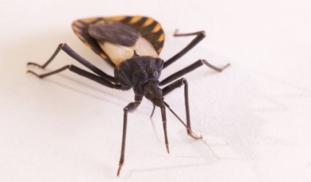Please wait...
About This Project
An estimated 6 – 7 million people in Latin America and 300,000 U.S. citizens are infected with the protozoan parasite Trypanosoma cruzi that results in Chagas’ disease, a neglected tropical disease (NTD). Principally spread by the kissing bug (cover image), there exists an urgent need for development of new therapeutics to replace the outdated clinically used drugs, benznidazole and nifurtimox. Our research focuses on the discovery of novel antichagasic compounds for improved medicine.

Browse Other Projects on Experiment
Related Projects
Molecular target-based focused screen for Chagas' disease therapeutic drug discovery
The etiological agent for Chagas' disease is the protozoan parasite Trypanosoma cruzi, which affects 6...
Target-based drug discovery for coronavirus disease 2019
Therapeutics in any modality to combat Severe Acute Respiratory Syndrome Coronavirus 2 (SARS-CoV-2) infections...
Early-Stage Drug Discovery for Chagas' Disease
An estimated 6 – 7 million people in Latin America and 300,000 U.S. citizens are infected with the protozoan...





